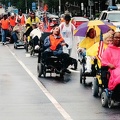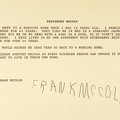6/DISCLOSURE
NOVEMBER-DECEMBER 1997
[Headline] Even Newt & Bill have to learn to ADAPT
If ever there were a textbook example of the payoff from working together, ADAPT s two-week action In June would have to be it.
The key victory was introduction of the Medicaid Community Attendant Services Act, MiCASA--the culmination of seven years of work by thousands of ADAPT members from across the nation--a date to meet the President, and the start of preliminary meetings with his Cabinet folks.
Heading into DC things were look-ing a bit bleak. The White House was stalling, House Speaker Gingrich seemed to be waffling on the deal he made years ago in Atlanta to introduce CASA, and Congressional Democratic leadership seemed bound to ignore us.
[Subheading] Promises, promises
During the November ADAPT action in Atlanta, the President had promised, through his then Director of Public Liaison Alexis Herman, to meet with ADAPT before the end of the first quarter of 1997. Here we were at June. Well we had taken off our shoes for some heavy math but there was no way we could make June come out as anything but the end of the second quarter, and still not even a commitment for a meeting date.
An eleventh hour call from Clinton's staff saying "we'll be setting up something soon" was taken as nothing more than a delay tactic. And ADAPT had had it with delays. So we wrote a letter listing the consistently broken promises from the White House and demanding a response with a definite meeting date by 5 p.m. Monday, the next day.
Then all 250 of the first wave of ADAPTers marched over to Bill's place to deliver the letter. We had made it 3 feet wide by 5 feet tall, to assure it would not get lost in a pile on someone's desk. Once at the White House we strung out in a line across the front, and each and every ADAPT person signed the letter.
At first the Secret Service, who guard behind the black iron fence, were reluctant to take the letter up to the White House, but when we said we'd then have to stay to make sure it got inside, they figured out a way to deliver it for us.
When we arrived back at the hotel, it was well after 6 p m. A fax from the White House had just arrived. It consisted of a White House cover sheet, and two blank pages. Granted politicians don't like to make commitments, but this seemed a trifle vague, even for this master politician. Puzzled, we called to see if Clinton had intended such a vacant response, but allegedly everyone had gone home
for the day. So we had to take it on face value.
Tuesday we took the matter of this meeting to the one who made the promise: Alexis Herman herself. Since November she had received a promotion, she's now the Secretary of La-bor. Her office was right down the street, so we decided to drop in and see what she could do to clear up the problem. She had, after all, said in her November letter to ADAPT she would "be in touch with [ADAPT] directly to discuss the appropriate arrangements for this meeting." We figured she probably wasn't getting her tele-phone messages, or all her mail, be-cause she had never responded to one of our calls or letters.
[Pulled quote] At first the Secret Service, who guard behind the black iron fence, were reluctant to take the letter up to the White House, but when we said we'd then have to stay to make sure it got inside, they figured out a way to deliver it for us.
We poured through the security guards' station and flooded the Department of Labor lobby, a big echo-ing glass and granite job. Workers crowded the balconies and stairways as we chanted "We Want Alexis' and "Our Homes NOT Nursing Homes." Herman was off at a celebration when ADAPT hit the lobby. Negotiations were turned over. to her replacement Maria Echaveste. It finally turned out a little job coaching seems to be in order for the White House staff. They relaxed the letter this time with the pages facing the right direction so we were able to see the response. Clinton set September 10 as the meeting date, and with Echaveste now involved, we strengthened the deal by arranging to hold the first of the preliminary meetings with the Cabinet folks who deal with long term care for while we would still be in town.
[Subheading] Second wave
Two days later the second wave rolled in. After Sunday's meetings and workshops and updates, this group was ready for bear. Monday of the second week was June 21, the date by which Gingrich had promised to introduce CASA.
We had not yet received a copy of the "final draft" and we did not want something we had never seen being introduced, but we were not going to let this deadline slide. ADAPT has fought for a national attendant services program for seven years, and since 1994 Gingrich had promised to introduce such a bill.
[Subheading] Newt watch
The leadership team decided on perhaps the hardest action of all, at least for ADAPT folks--a vigil, a Newt Watch. We ringed the Capitol Rotunda and settled in. Tensions were high as the tourists flowed through the room and we waited and waited. The noon deadline passed and Gingrich's staff said they were working as fast as they could with Legislative Council (the folks who really write all the bills introduced in Congress).
We agreed to wait a bit longer, and in the meantime sent out feelers to some of the other Congressional leadership. Our message: we are here, we want CASA, are you with us? Minority Leader Dick Gephardt finally agreed to meet with a few of us the next day and committed his support for the principles of CASA.
By 5 p.m., though we had made progress with other members of Congress, we had all but lost hope for the Speaker. The leadership team decided that we would start chanting and block-ing at 6 p.m. to at least send a message of our commitment to the issue. Capitol Police must have gotten wind of the plan because only a few minutes later Gingrich's staff called and asked a small group of ADAPT folks meet with them and Legislative Council directly to iron out any problems so the bill could be introduced late that night (the House was staying late to work on the budget anyway).
We had come so close; to throw it away would be a tragedy, but what if this was just another trick? Then the leadership team came up with a plan. We left the Rotunda, the small group went off to meet with Gingrich's people, and the rest of us marched over to the Rayburn building, where Gingrich's office is located.
We took up our Newt Watch again. The hours crawled by. There was no word. We just had to have faith, and we did. But we also began planning in case we needed to extend this stay. Folks agreed.to give& up plane tickets and camp out if need be. We were too close to give up now, everyone was ready to do what needed to be done.
After a couple of hours the negotiators sent out Steve Gold and Zan Thornton with an update. We—finally--were sitting down with Legislative Council staff who understood our goals. Together we were rewriting the bill to be much better than it was originally, but it would take a while. So we continued to wait. Later they told us Gingrich's people kept asking "they're still out there?"
Around midnight when our people emerged from the building with a new and better Medicaid Community Attendant Services Act, MiCASA, and a commitment it would be introduced as soon as Gingrich himself had read it.
ADAPT has fought for a national attendant services program for seven years, and since 1994 Gingrich had promised to introduce a bill [such as CASA].
One day of the Newt Watch had been extremely productive. We had finally been able to sit down together with all the players and we had squeezed out a bill agreeable to all. We could continue the Newt Watch until we saw it introduced, but several other targets remained to attend to.
[Subheading] 2020 vision
The leadership team agreed we had another target to tackle and we would still have Wednesday if the Speaker reneged on his promise. Just as we gathered to share a letter of commitment to meet with us from the Secretary of. Transportation, Mike Auberger's cell phone rang. MiCASA was introduced. It was now HR 2020. Talk about timing.
This left another hard decision for the leadership team to make. There are several very confrontational, targets ADAPT needs to tackle. We could address one then or we'd probably have address it in the future. We had one more day. How could it best be spent?
Discussion went round and round and in the end the decision: keep the heat on CASA. We would visit every last member of the House of Representatives' offices, leave them a copy of CASA and talk to their staff about it.
There are three House office buildings, and we had three color teams. Each team took a building, split up and covered each floor. By the end of the day we had distributed 440 copies of CASA. We had talked to 420 aides and a smattering of Representatives.
Those who had been forced into nursing homes or ICF-MRs shared their stories. Those among us who provided attendant services shared how easily the concept can be implemented. Gingrich's office was getting lots of calls on this new bill. We had our first co-sponsor. Mi-CASA had been launched.
- Created on
- Tuesday 16 July 2013
- Posted on
- Thursday 21 November 2019
- Albums
- Visits
- 268
- Rating score
- no rate
- Rate this photo


0 comments